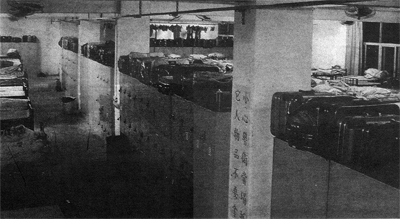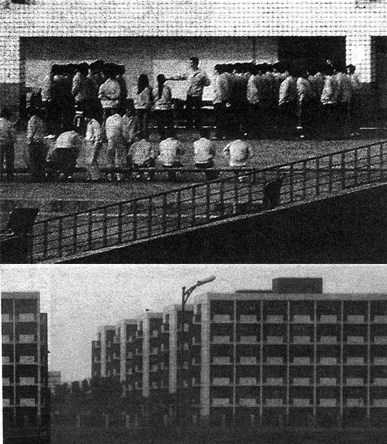

 subscribe
subscribeI just wonder if this is also introduced to Chinas sweat shop workers, where the iPod's are connected to there gloves, which then can tell the story of there healthy live.
 To team up with Nike uh, but now we can develop some good counter tek let see what will come next in gadgeteria. Do not forget all the guys which are on the run crossing some borders with there nike's. NIKEBOYCOTT get BLACK SPOT SHOES or WORNAGAIN or soon at Boutique Gegenalltag in Vienna shoes from Bernhard Willhelm, Paris.
To team up with Nike uh, but now we can develop some good counter tek let see what will come next in gadgeteria. Do not forget all the guys which are on the run crossing some borders with there nike's. NIKEBOYCOTT get BLACK SPOT SHOES or WORNAGAIN or soon at Boutique Gegenalltag in Vienna shoes from Bernhard Willhelm, Paris.
Image and text source: The Mail on Sunday
The report, 'iPod City', isn't available online, from Mail on Sunday Inside Apple's iPod factories.

"We have to work too hard and I am always tired. It's like being in the army. They make us stand still for hours. If we move, we are punished by being made to stand still for longer…We have to work overtime if we are told to and can only go back to the dormitories when our boss gives us permission…If they ask for overtime we must do it. After working 15 hours until 11:30pm, we feel so tired."
"Payment is lower because the boss wants to reduce our costs," he says. "Prices need to be competitive to get orders from abroad.

James Kynge, author of China Shakes The World, argues that despite Westerners' perceptions about working conditions in factories, the wages are a godsend that are transforming rural China. "The money sent back to farming families from the workers now exceeds the amount made from agriculture," he says.
Workers will be lucky if they make two percent of the profit from an iPod. Foxconn will make less than ten percent. Far more money is spent by Apple on marketing the product than making it.
A BusinessWeek article profiles a Hewlett-Packard manager whose job is specifically to fight for "Supply Chain Social & Environmental Responsibility BusinessWeek.
Version 1.0 - November 13, 2005 1 - Apple Supplier Code of Conduct
Apple is committed to ensuring that working conditions in Apple’s supply chain are safe, that workers are treated with respect and dignity, and that manufacturing processes are
environmentally responsible. Apple’s suppliers are obligated, in all of their activities, to operate in full compliance with the laws, rules and regulations of the countries in which they operate. This Supplier Code of Conduct goes further, drawing upon internationally recognized standards, in order to advance social and environmental responsibility. Apple requires that its first tier suppliers implement this Code using the management systems described below.
Apple’s Supplier Code of Conduct is modeled on and contains language from the Electronic Industry Code of Conduct. Recognized standards such as International Labour Organization
Standards (ILO), Universal Declaration of Human Rights (UDHR), Social Accountability International (SAI), and the Ethical Trading Initiative (ETI) were used as references in preparing this Code and may be useful sources of additional information. A complete list of references is provided at the end of the Code.
Labor and Human Rights
Apple suppliers must uphold the human rights of workers, to treat them with dignity and respect as understood by the international community.
Discrimination
Suppliers may not discriminate against any worker based on race, color, age, gender, sexual orientation, ethnicity, disability, religion, political affiliation, union membership, or marital status in hiring and employment practices such as promotions, rewards, access to training, job assignments, wages, benefits, discipline, termination and retirement. Suppliers may not require a pregnancy test except where required by applicable laws or regulations.
Harsh Treatment and Harassment
Suppliers must be committed to a workplace free of harassment. Suppliers may not threaten workers with or subject them to harsh or inhumane treatment, including sexual harassment,
sexual abuse, corporal punishment, mental coercion, physical coercion, or verbal abuse.
Involuntary Labor
Suppliers may not use any form of forced, bonded, indentured, or prison labor. All work must be voluntary and workers should be free to leave with reasonable notice. Workers must not be
required to hand over any government-issued identification, passports, or work permits as a condition of employment.
Child Labor
Suppliers may not use child labor at any stage of manufacturing. Workers must be at least the minimum age for employment in that country or the age for completing compulsory education in that country, whichever is higher. In no event may a worker be less than 15 years old (except as permitted by ILO Minimum Age Convention No. 138). Workers under 18 years of age may not perform work likely to jeopardize the heath, safety or morals of young persons, consistent with ILO Minimum Age Convention No. 138. This Code does not prohibit participation in
Version 1.0 - November 13, 2005 2
legitimate workplace apprenticeship programs that are consistent with Article 6 of ILO Minimum Age Convention No.138.
Working Hours
Except in emergency or unusual situations, a work week should be restricted to 60 hours, including overtime, and workers should be allowed at least one day off per seven-day week.
Under no circumstances may working hours exceed the maximum set by applicable laws. Suppliers must offer vacation time, leave periods and holidays consistent with applicable laws.
Remuneration
Suppliers must pay wages, benefits, and overtime to workers in accordance with applicable laws, including those related to minimum wages, overtime, hours, and legally mandated benefits. Suppliers may not discriminate based on race, color, gender, sexual orientation, ethnicity, religion, political affiliation, or marital status. The basis on which workers are being
paid must be clearly conveyed to them in a timely manner.
Freedom of Association
Suppliers must respect the right of workers to associate freely, join workers’ organizations, seek representation, and bargain collectively, as permitted by and in accordance with local laws. Suppliers may not discriminate with respect to employment based on union membership and, in particular, may not make employment subject to the condition that the worker relinquish union membership or agree not to join a union or cause the dismissal of or otherwise prejudice a worker by reason of union membership or participation in union activities outside working hours (or within working hours if the supplier has consented to such activities). Suppliers must protect against acts of interference with the establishment, functioning, or administration of workers’ organizations in accordance with local laws.
Health and Safety
Apple recognizes that integrating sound health and safety management practices into all aspects of business is essential to maintain high morale and produce innovative products.
Suppliers must be committed to creating safe working conditions and a healthy work environment for all of their workers.
Protective Measures
Suppliers must provide appropriate controls, safe work procedures, preventative maintenance, and protective measures (such as physical guards, interlocks, and barriers) to mitigate health and safety risks in the workplace. When hazards cannot be adequately controlled by these means, suppliers must provide workers appropriate personal protective equipment. Workers
must have the right to refuse unsafe working conditions without fear of reprisal until management adequately addresses their concerns.
Industrial Hygiene
Suppliers must identify, evaluate, and control worker exposure to hazardous chemical, biological, and physical agents. When hazards cannot be adequately controlled by engineering and administrative means, suppliers must provide workers appropriate personal protective equipment.
Emergency Prevention, Preparedness and Response
Suppliers must anticipate, identify, and assess emergency situations and events and minimize their impact by implementing emergency plans and response procedures, including
Version 1.0 - November 13, 2005 3
emergency reporting, worker notification and evacuation procedures, worker training and drills, appropriate first-aid supplies, appropriate fire detection and suppression equipment, adequate exit facilities, and recovery plans.
Occupational Injury and Illness
Suppliers must establish procedures and systems to manage, track, and report occupational injury and illness, including provisions to encourage worker reporting, classify and record injury and illness cases, provide necessary medical treatment, investigate cases and implement corrective actions to eliminate their causes, and facilitate return of workers to work.
Physically Demanding Work
Suppliers must identify, evaluate, and control worker exposure to physically demanding tasks, including manual material handling, heavy lifting, prolonged standing, and highly repetitive or forceful assembly tasks.
Dormitory and Canteen
Suppliers must provide workers with clean toilet facilities, access to potable water, and sanitary food preparation and storage facilities. Worker dormitories provided by the supplier or a labor agent must be clean and safe and provide emergency egress, adequate heat and ventilation, and reasonable personal space.
Communication
In order to foster a safe work environment, suppliers should ensure that workers receive appropriate workplace health and safety information and training, including written health and
safety information and warnings in the primary language of its workers.
Worker Heath and Safety Committees
Suppliers are encouraged to permit worker Health and Safety committees to enhance ongoing health and safety education and to encourage worker input regarding health and safety issues
in the workplace.
The Environment
At Apple, environmental considerations are an integral part of our business practices. Suppliers must be committed to reducing the environmental impact of their designs, manufacturing
processes, and waste emissions.
Hazardous Substance Management and Restrictions
Suppliers must comply with the most recent version of Apple’s Regulated Substances Specification, 069-0135, and with any applicable laws and regulations prohibiting or restricting
specific substances. To ensure safe handling, movement, storage, recycling, reuse, and disposal, suppliers must identify and manage substances that pose a hazard if released to the environment and comply with applicable labeling laws and regulations for recycling and disposal. Suppliers must post Material Safety Data Sheets for any hazardous or toxic substances used in the workplace and train workers who will come into contact with such substances in the workplace.
Wastewater and Solid Waste Emissions
Wastewater and solid waste generated from operations, industrial processes, and sanitation facilities must be monitored, controlled, and treated as required by applicable laws and regulations before discharge or disposal.
Version 1.0 - November 13, 2005 4
Air Emissions
Air emissions of volatile organic chemicals, aerosols, corrosives, particulates, ozone depleting chemicals, and combustion by-products generated from operations must be characterized, monitored, controlled, and treated as required by applicable laws and regulations before discharge.
Environmental Permits and Reporting
Suppliers must obtain, maintain, and keep current all required environmental permits (e.g. discharge monitoring) and registrations and follow the operational and reporting requirements of such permits.
Pollution Prevention and Resource Reduction
Suppliers must endeavor to reduce or eliminate waste of all types, including water and energy, by implementing appropriate conservation measures in its facilities, in its maintenance and
production processes, and by recycling, re-using, or substituting materials.
Ethics
Apple suppliers must be committed to the highest standards of ethical conduct when dealing with workers, suppliers, and customers.
Corruption, Extortion, or Embezzlement
Corruption, extortion, and embezzlement, in any form, are strictly prohibited and may result in immediate termination as an Apple supplier and in legal action.
Disclosure of Information
Suppliers must disclose information regarding its business activities, structure, financial situation, and performance in accordance with applicable regulations and prevailing industry
practices.
No Improper Advantage
Suppliers may not offer or accept bribes or other means of obtaining undue or improper advantage.
Fair Business, Advertising and Competition
Suppliers must uphold fair business standards in advertising, sales and competition. Suppliers must offer means to safeguard customer information.
Whistleblowers
Suppliers must create programs to ensure the protection of supplier and worker whistleblower confidentiality.
Community Engagement
Suppliers are encouraged to engage the community to help foster social and economic development and to contribute to the sustainability of the communities in which they operate.
Protection of Intellectual Property
Suppliers must respect intellectual property rights; transfer of technology and know-how must be done in a manner that protects intellectual property rights.
Version 1.0 - November 13, 2005 5
Management Systems
Apple suppliers must adopt or establish a management system designed to ensure compliance with this Code and applicable laws and regulations, identify and mitigate related operational
risks, and facilitate continuous improvement. ISO 14001, OHSAS 18001, Eco Management and Audit System (EMAS) may be useful resources. The management system should contain the
following elements:
Company Commitment
A corporate social and environmental responsibility statement affirming the supplier’s commitment to compliance and continual improvement.
Management Accountability and Responsibility
Clearly identified company representatives responsible for ensuring implementation and periodic review of the status of the supplier’s management systems.
Legal and Customer Requirements
A process to identify, monitor and understand applicable laws and regulations and the additional requirements imposed by this Code.
Risk Assessment and Management
A process to identify environmental, health and safety, and labor practice risks associated with their operations, determine the relative significance of each risk, and implement appropriate procedures and physical controls to ensure regulatory compliance to control the identified risks. Risk assessments for health and safety must include warehouse and storage facilities, plant and facility support equipment, laboratories and test areas, bathrooms, kitchens, cafeterias, and worker housing.
Performance Objectives with Implementation Plans and Measures
Written standards, performance objectives, targets, and implementation plans, including a periodic assessment of the supplier’s performance against those objectives.
Training
Appropriate training programs for managers and workers.
Communication
A process for communicating clear and accurate information about the supplier’s performance, practices, and expectations to its workers, suppliers, and customers, and a clear complaint
mechanism.
Worker Feedback and Participation
An ongoing process to obtain feedback on processes and practices related to this Code and to foster continuous improvement.
Audits and Assessments
Periodic self-evaluations to ensure that the supplier and its subcontractors are complying with this Code and with applicable laws and regulations. Apple may audit periodically on terms and conditions set forth in its agreement with Supplier.
Corrective Action Process
A process for timely correction of any deficiencies identified by an internal or external audit, assessment, inspection, investigation, or review.
Version 1.0 - November 13, 2005 6
Documentation and Records
Creation of documents and records to ensure regulatory compliance and conformity to this Code, with appropriate confidentiality measures to protect privacy.
References
Apple consulted the following references in preparing this Code.
Electronic Industry Code of Conduct, October 2004
ILO Code of Practice in Safety and Health
ILO International Labor Standards
National Fire Protection Agency
OECD Guidelines for Multinational Enterprises
United Nations Convention Against Corruption
Universal Declaration of Human Rights
Copyright © 2005 Apple Computer, Inc. All rights reserved.
| Attachment | Size |
|---|---|
| Bernhard WillhelmShoe.jpg | 65.13 KB |
| IpodCity1.jpg | 90.93 KB |
| Ipodcity2.jpg | 168.05 KB |